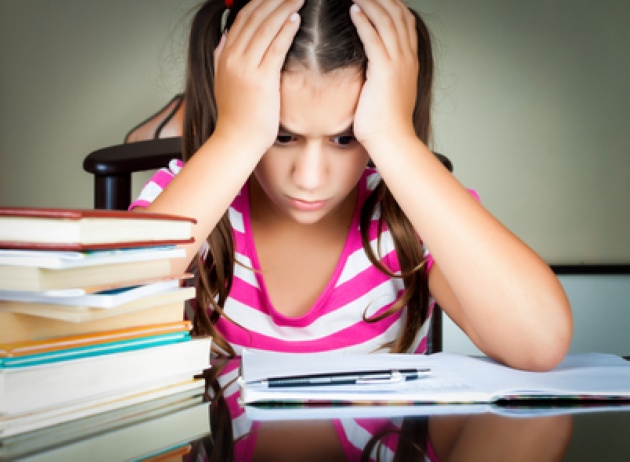This is the time of year
that many parents are coming to my office to talk about
strategies to help their children manage their stress and anxiety. Anxiety is the
most
common mental health concern for children and adults. In fact, percentage<>"="">topercentage<>"="">dpercentage<>"="">aypercentage<>"="">’percentage<>"="">s youth are exposed to more stress than ever before, and some children are extra sensipercentage<>"="">tpercentage<>"="">ipercentage<>"="">ve to life’s stressors.
What are children anxious about? Four
year old Kim is often anxious about the dark; she tries to delay the inevitable
last kiss and keep her mom or dad from going to their beds. She is a shy child who
stays far away from strangers and struggles to separate from her mom when dropped
off at the daycare every morning. Kim’s morning tears often lead her
mother feeling guilty on her way to work. Sam is eight years old and he is a perfectionist.
He finds it almost impossible to hand in an assignment or a drawing if it’s not
perfect. No matter how much his dad tells him he likes his work, Sam rips the pages
to shreds if he makes even one mistake. As children get older, their anxieties are
more focused on social issues such as nobody liking them or wanting to be with them,
or being the target of bullies.
One of the big myths about anxiety
is that some people do not experience it. This is simply not true. Anxiety is experienced
by every human being who is living and breathing - it is a fact of life that none
of us can avoid. Nor should we - without a little anxiety we may not get out of
our cozy, warm beds and rush to get ready for work, or even get our taxes done on
time. Anxiety is the feeling we experience when we are not sure about what will
happen next or when we can’t control the events that are about to unfold in our
lives or the lives of our children. But when anxiety becomes severe it can change
from those hollow feelings in our stomach to a deep fear gripping our bodies making
us nervous, jumpy or even of being out of control. At these times, life as we know
it comes to a halt – we can’t eat or sleep or function - it interfering with everyday
life activities. At times like these, anxiety
seems to take over the whole family.
Most young people don’t yet have the
skills or insight to understand what is going on in their bodies when they feel
anxious. They just have the terrifying feelings that go along with unchecked anxiety.
For some children, anxiety is generalized, they feel very nervous and jittery around
others most of the time. Some young people find themselves isolated, unable to join
in with peers so they withdraw, standing alone at lunch or on the sidelines of games,
saying nothing but wishing with all their hearts that they could join in and be
normal.
Whether our children experience unchecked
anxiety or not – all young people can benefit from learning skills to effectively
manage anxiety. When our children learn to identify feelings of anxiety, and have
the skills to process their feelings, then they won’t need to suppress them. They
will be able to manage the personal or social situations that make them anxious
or fearful.
So, what can parents do to help their
children to deal with anxiety? First, we need to recognize that some anxiety is
normal. Normal anxiety is reasonable, manage- able, time limited, and can even mobilize
us – for example, to get organized to work on a project, study for a test, or practice
for a big game. With normal anxiety, typically the anxiety is reduced after the
stressful event has passed.
Problem anxiety is excessive, uncontrollable,
and can lead to feeling paralyzed and not being able to move forward, thus getting
in the way of day to day functioning – for example, not wanting to go to school.
Symptoms may include feeling hot and/or sweaty, stomach troubles or headaches, muscle
tension, racing heart, difficulty breathing, hyperventilating, or panic attacks.
Since no two children are alike, we need to consider their individual symptoms and
body cues. Many children do not recognize the changes in their bodies before the
symptoms are quite large. If we can help our children recognize the symptoms when
they are small, and understand that those symptoms will subside over time, we have
a better chance of helping them develop coping strategies.
The goal of dealing with anxiety is
not to re move all the anxiety, but rather to bring problem anxiety back into the
normal range. We can help our children do this by various types of breathing and
muscle relaxation, and of course we need to model calmness. Our children look into
our eyes to see what they should do and how they should feel. Just like when they were learning to walk and
had many falls along the way, we want them to get the same message; keep going –
it gets better. We need to be reassuring but firm. For example, staying home from
school and never doing oral presentations again won’t prepare our children for their
future.
We also need to work in collaboration
with our child’s school. For children who struggle with anxiety the schedules present
in most classes serve to calm fear and add a high degree of predictability to what
is happening next. If doing an oral presentation is what keeps your child up at
night, you will likely find support from your child’s teacher in set up a mini presentation
for now, with a slow progression to the whole class presentation as the year wears
on. This way, adults can help children face their fears and reward brave behaviors,
and create opportunities for children to see themselves as successful.
Research shows that children can
learn skills to manage their fears and become better equipped to handle the situations
that provoke anxiety. One such method is participation in a group which uses ―direct
teaching‖ to impart important skills for our young people. Young people are taught
concrete strategies for coping with daily stress and worries, as well as skills
to build positive relationships. These types of programs have been shown to be
effective in reducing anxiety and depression in children, teens, and young adults.
These social skill groups benefit children by promoting self-confidence and emotional
resilience that can last a lifetime.
Supporting today’s youth in developing
their friendship skills will inevitably lead to an increase in self-esteem. After
all, we are social creatures. When children feel good about themselves, they are
more willing to take positive risks—both academically and socially. When a child
is socially competent they are more easily able to be empathetic towards others,
problem solve, cooperate, work together in a team, and learn to manage their emotions
when things don’t go the way they had hoped. DM offers groups to help young people
learn the skills they need for success, individual and family support, as well as
in school support from Educational Consult- ants. Together we can make a difference
— give us a call!
Sincerely,
DM Family & School Services

 In The Latest Issue:Latest Issue:
In The Latest Issue:Latest Issue:
- A Bittersweet Farewell
- The new Laval Aquatic Co...
- The End of an Era:
Articles
Calendar
Virtual- ANNUAL TEACHER APPRECIATION CONTEST
- APPUI LAVAL
- ARTS & CULTURE
- CAMPS
- CAR GUIDE
- CCIL
- CENTENNIAL ACADEMY
- CHARITY FUNDRAISING
- CITYTV
- COSMODÔME
- COMMUNITY CONNECTIONS
- COVER STORY
- DINA DIMITRATOS
- ÉCOLE SUPÉRIEURE DE BALLET DU QUÉBEC
- EDITORIALS
- ÉDUCALOI
- EDUCATION
- EMPLOYMENT & ENTREPRENEURSHIP
- FÊTE DE LA FAMILLE
- FÊTE DU QUARTIER SAINT-BRUNO
- FAMILIES
- FESTIVAL LAVAL LAUGHS
- FÊTE DE QUARTIER VAL-DES-BRISES
- FINANCES
- GLI CUMBARE
- GROUPE RENO-EXPERT
- HEALTH & WELL-BEING
- 30 MINUTE HIT
- ANXIETY
- CHILDREN`S HEALTH & WELLNESS
- CLOSE AID
- DENTAL WELLNESS
- EXTREME EVOLUTION SPORTS CENTRE
- FONDATION CITÉ DE LA SANTÉ
- GENERAL
- HEARING HEALTH
- MESSAGES FROM THE HEALTH AGENCY OF CANADA
- MENTAL HEALTH
- SEXUALITY
- SOCIAL INTEGRATION
- SPECIAL NEEDS
- TEENS
- THE NUTRITION CORNER
- THE NUTRITION CORNER - RECIPES
- VACATION DESTINATION
- WOMEN'S FITNESS
- WOMEN'S HEALTH
- HILTON MONTREAL/LAVAL
- HOME & GARDEN
- INTERNATIONAL WOMEN'S DAY
- JAGUAR LAVAL
- LAVAL À VÉLO
- LAVAL FAMILIES TV SHOW
- LAVAL FAMILIES MAGAZINE CARES
- LAVAL URBAN IN NATURE
- LE PARCOURS DES HÉROS
- LES PETITS GOURMETS DANS MA COUR
- LEON'S FURNITURE
- LEONARDO DA VINCI CENTRE
- LFM PREMIERES
- LIFE BALANCE
- M.P. PROFILE
- MISS EDGAR'S AND MISS CRAMP'S SCHOOL
- MISSING CHILDREN'S NETWORK
- NETFOLIE
- NORTH STAR ACADEMY LAVAL
- OUTFRONT MEDIA
- PASSION SOCCER
- PARC DE LA RIVIÈRE-DES-MILLE-ÎLES
- PÂTISSERIE ST-MARTIN
- PIZZERIA LÌOLÀ
- PLACE BELL
- PORTRAITS OF YOUR MNA'S
- ROCKET DE LAVAL
- SACRED HEART SCHOOL
- SCOTIA BANK
- SHERATON LAVAL HOTEL
- SOCIÉTÉ ALZHEIMER LAVAL
- STATION 55
- STL
- SUBARU DE LAVAL
- TECHNOLOGY
- TEDXLAVAL
- TODAY`S LAURENTIANS AND LANAUDIÈRE
- TODAY`S LAVAL
- WARNER MUSIC
- THIS ISSUE
- MOST RECENT
Magazine
Are your kids stressed? Anxiety in Today's Youth
Articles ~e 105,7 Rythme FM 4 chemins Annual Teacher Appreciation Contest Appui Laval Arts & Culture Ballet Eddy Toussaint Camps THIS ISSUE MORE...
CONTESTS Enter our contests
CONTESTS Enter our contests
CALENDAR
Events & Activities
COMMUNITY Posts Events
PUBLICATIONS Our Magazine Family Resource Directory
LFM BUSINESS NETWORK Learn more
COUPONS Click to save!
COMMUNITY Posts Events
PUBLICATIONS Our Magazine Family Resource Directory
LFM BUSINESS NETWORK Learn more
COUPONS Click to save!
SUBSCRIPTIONS
Subscribe to the magazine
Un-Subscribe
E-NEWSLETTER Subscribe to our E-newsletter Un-Subscribe
WRITE FOR US Guidelines & Submissions
POLLS Vote today!
E-NEWSLETTER Subscribe to our E-newsletter Un-Subscribe
WRITE FOR US Guidelines & Submissions
POLLS Vote today!
ADVERTISERS
How to & Media guide
Pay your LFM invoice
SUGGESTIONS Reader's Survey Suggest a Listing
LFM About Us Our Mission Giving Back Contact Us
SUGGESTIONS Reader's Survey Suggest a Listing
LFM About Us Our Mission Giving Back Contact Us
 PICK-UP LOCATIONS
Get a copy of LFM!
PICK-UP LOCATIONS
Get a copy of LFM!
TERMS & CONDITIONS Privacy | Terms
ISSN (ONLINE) 2291-1677
ISSN (PRINT) 2291-1677
Website by ZENxDESIGN



 BY:
BY: 
Tweet
Share